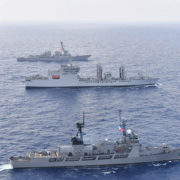
A quadrilateral cooperative naval drill is currently being conducted in the South China Sea by a Philippine Navy patrol ship and five other warships from Japan, India, and the United States.
The Navy spokesman Capt. Jonathan Zata assured, however, that the naval exercise underway in international waters is not directed towards any country in the disputed region.
“It’s being held in international waters of the West Philippine Sea. We’re not trying to pick on one country but we are just highlighting the fact that we are cooperating with other navies,” said Zata on Thursday, May 9.
Currently, BRP Andres Bonifacio — the Philippine Navy’s patrol ship — is engaging the vessels of Japan Maritime Self Defense Force (JMSDF) JS Izumo and JS Murasame; Indian warships INS Kolkata and Shakit, and the U.S. warship USS William P. Lawrence in different types of naval formation exercises called “Formex.”
These exercises are for addressing various types of threats from the air, surface and sub-surface via established terminologies, publication and communication protocols.
“That’s what they’re practicing while headed for Singapore for the next phase of the exercise,” Zata said.
The first phase of the drill was held in the open waters of Busan, South Korea.
Different approach
Meanwhile, David Hale, undersecretary for political affairs at the U.S. Department of State, said that Washington will continue to protect its interests as well as that of its allies and partners in the Indo-Pacific region.
According to him, the U.S. government wants a constructive relationship with China that produces results for its people and for others involved.
“We’re going to be actively defending American interests and values and those of our allies. That is in the area of trade, religious freedom, human rights and predatory and aggressive action in the South China Sea and even further afield,” Hale told the media during his recent visit to Burma.
His statement was in response to a question raised by a Singaporean journalist on U.S. Indo-Pacific strategy, specifically on the U.S. administration’s stepping up its pressure on China.
“Our own approach is different, in the sense that it’s a fundamentally different approach to economic development and governance, one in which free market and free and fair trade are key elements to this. Market-driven investments rather than state-driven investments,” Hale said.





